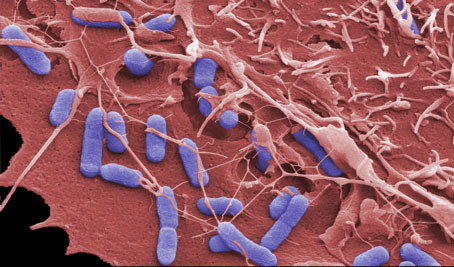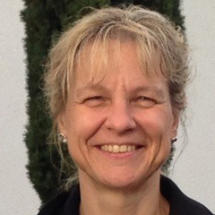Prof. Dr. Petra Dersch
No positions via CiM-IMPRS in 2026
Molecular mechanisms underlying bacterial infections of the intestine

Microbiology / Virology / Infectiology
Immunology/Inflammation
Cell Biology
In order to gain a comprehensive understanding of the molecular mechanisms underlying bacterial infections of the intestine, the Institute of Infectiology studies
• How do intestinal bacterial pathogens manage to attach to, enter and persist in eukaryotic cells and host tissues?
• Which bacterial and host factors are involved and when do the cells produce these factors?
• When, where, and by what regulatory mechanisms are virulence factors produced as part of the infection process?
• How do intestinal pathogens adapt their metabolism during an infection?
• How does the host defend the infection and which strategies do the bacteria use to prevent host defense mechanisms
• How can we use bacterial factors for therapeutic purposes, e.g. drug delivery

Vita
- 2019: Director (W3) of the Institute for Infectiology at the University of Münster, Münster, Germany
- 2008-2019: Head of the Department (W3) 'Molecular Infection Biology' at the Helmholtz Centre for Infection Research, Braunschweig
- 2008-2019: Full Professor (W3) of Molecular Infection Biology at the TU Braunschweig
- 2005 – 2008: Associate Professor (W2) for Microbiology at the TU Braunschweig
- 2003 – 2005: Junior Research Group Leader at the Robert Koch-Institute, Berlin
- 1998 – 2002: Group leader (C1) at the Free University Berlin, Germany
- 2005: Habilitation in Microbiology, Free University Berlin, Germany
- 1995 – 1998: Postdoctoral researcher, DFG funded, at the Tufts Medical School/Howard Hughes Medical Institute with Prof. Dr. Ralph Isberg, Boston, USA
- 1991 – 1995: PhD in Microbiology at the University of Konstanz and the Max Planck-Institute for Terrestrial Microbiology Marburg
- 1984 – 1990: Studies in Biology at the University of Konstanz and the University of Ulm
Selected references
Kusmierek M., Hoßmann J., Witte R., Opitz W., Vollmer I., Volk M., Heroven AK., Wolf-Watz H., Dersch P. (2019). A bacterial secreted translocator hijacks riboregulators to control type III secretion in response to host cell contact, PLoS Pathogens 15(6):e1007813.
Nuss AM.*, Beckstette M.*, Pimenova M., Schmühl C., Opitz W., Pisano F., Heroven AK., and Dersch P. Tissue dual RNA-seq allows fast discovery of infection-specific functions and ribo¬regulators shaping host-pathogen transcriptome. (2017). Proc. Natl. Acad. Sci. USA 114(5):E791-E800.
Heine W., Beckstette M., Heroven A.K., Thiemann S., Heise U., Nuss A.M., Pisano F., Strowig T., Dersch P. (2018). Loss of CNFY toxin-induced inflammation drives Yersinia pseudotuber-culosis into persistency. PLoS Pathogens 14(2):e1006858.
Nuss AM.*, Schuster F.*, Roselius L., Klein J., Bücker R., Herbst K., Heroven AK., Pisano F., Witt¬mann C., Münch R., Müller J., Jahn D., and Dersch P. A precise temperature-responsive bistable switch controlling virulence. (2016). PLoS Pathogens 12(12):e1006091.
Wang H., Avican K., Ertmann S., Nuss A.M., Dersch P., Fällman M., Edgren T, Wolf-Watz, H. Increased plasmid copy number is essential for Yersinia T3SS function and virulence. (2016). Science 353(6298): 492-495.
